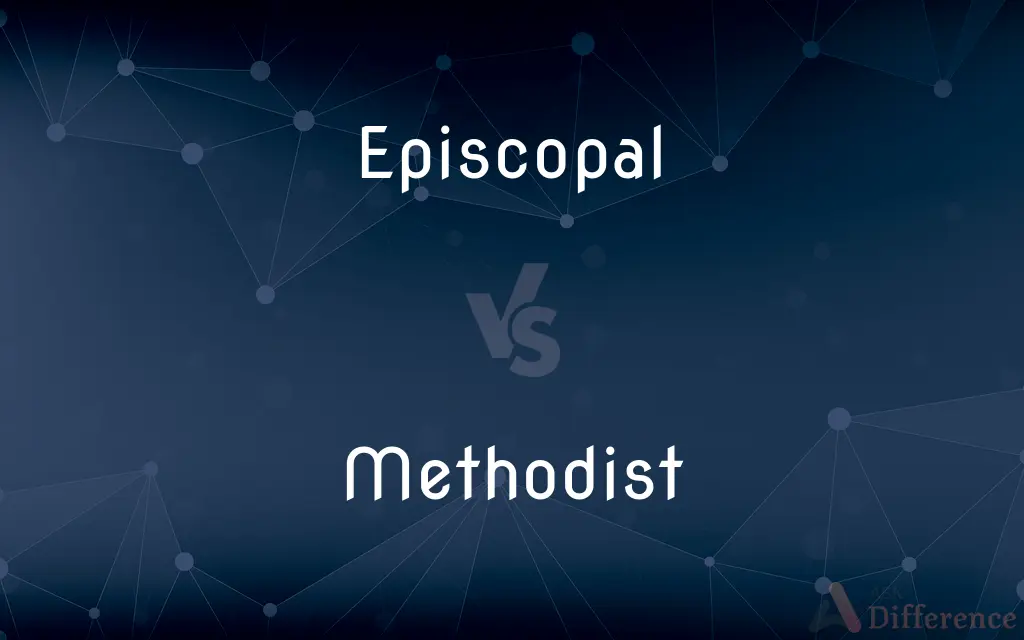Episcopal vs. Methodist — What's the Difference?
By Tayyaba Rehman — Updated on October 30, 2023
Episcopal refers to a church governed by bishops and is linked to the Anglican tradition, while Methodist pertains to a Protestant denomination founded by John Wesley emphasizing personal holiness and social reform.

Difference Between Episcopal and Methodist
Table of Contents
ADVERTISEMENT
Key Differences
Episcopal churches are part of the Anglican Communion, which has its roots in the Church of England. Methodist churches, on the other hand, began as a revival movement within the Anglican Church and later established their own denomination.
Governance in the Episcopal Church is hierarchical, with bishops overseeing dioceses or regions. In contrast, the Methodist Church often operates with a connectional system where annual conferences and a General Conference provide guidance.
Worship style can vary, but the Episcopal Church often follows a formal liturgy with roots in the Book of Common Prayer. The Methodist Church, while having its liturgical elements, often embraces a more evangelical style of worship.
Episcopal theology is broad and might encompass a range from conservative to liberal interpretations. Methodist theology, originating from John Wesley, emphasizes personal holiness, sanctification, and social reform.
The sacraments in the Episcopal Church, such as Holy Communion, are viewed as means of grace, similar to the Methodist understanding. However, the frequency and interpretation of these sacraments might differ between the two.
ADVERTISEMENT
Comparison Chart
Origin
Anglican Communion (Church of England)
Revival movement within the Anglican Church
Governance
Hierarchical, with bishops
Connectional system with conferences
Worship Style
Formal liturgy (often from the Book of Common Prayer)
Often evangelical with liturgical elements
Key Theological Emphasis
Broad spectrum of beliefs
Personal holiness, sanctification, social reform
Founders/Key Figures
Thomas Cranmer, Henry VIII
John Wesley, Charles Wesley
Compare with Definitions
Episcopal
Pertaining to the Anglican Church.
She attends the local Episcopal church on Sundays.
Methodist
Emphasizing personal holiness and sanctification.
Methodist teachings encourage believers to pursue a deep, personal faith.
Episcopal
Denoting the American branch of the Anglican Communion.
The Episcopal Church has its distinct traditions and liturgies.
Methodist
Pertaining to the teachings and practices of the Methodist Church.
The Methodist hymnal includes many songs written by Charles Wesley.
Episcopal
Relating to a bishop.
The Episcopal duties include overseeing multiple congregations.
Methodist
Stemming from a revival movement within the Anglican Church.
The Methodist revival brought thousands to faith in the 18th century.
Episcopal
Referring to the structure and hierarchy involving bishops.
Their decision required Episcopal approval before implementation.
Methodist
Advocating for social justice and reform as part of faith expression.
The Methodist tradition has a strong history of social activism.
Episcopal
Governed by or involving bishops.
Episcopal governance is hierarchical in nature.
Methodist
A member of an evangelical Protestant church founded on the principles of John and Charles Wesley in England in the early 1700s and characterized by active concern with social welfare and public morals.
Episcopal
Of or relating to a bishop.
Methodist
Methodist One who emphasizes or insists on systematic procedure.
Episcopal
Of, relating to, or involving church government by bishops.
Methodist
One who follows a method.
Episcopal
Episcopal Of or relating to the Episcopal Church.
Methodist
(history of science) One who limits the domain of science to that which can be investigated using the scientific method.
Episcopal
Of or relating to the affairs of a bishop in various Christian churches.
Methodist
Alternative form of Methodist.
Episcopal
Governed by bishops; as, an episcopal church.
Methodist
One who observes method.
Episcopal
Belonging to, or vested in, bishops; as, episcopal jurisdiction or authority; the episcopal system.
Methodist
One of an ancient school of physicians who rejected observation and founded their practice on reasoning and theory.
Episcopal
Of or pertaining to or characteristic of the Episcopal church;
The Episcopal hierarachy
Married by an Episcopalian minister
Methodist
One of a sect of Christians, the outgrowth of a small association called the "Holy Club," formed at Oxford University, a. d. 1729, of which the most conspicuous members were John Wesley and his brother Charles Wesley; - originally so called from the methodical strictness of members of the club in all religious duties.
Episcopal
Denoting or governed by or relating to a bishop or bishops
Methodist
A person of strict piety; one who lives in the exact observance of religious duties; - sometimes so called in contempt or ridicule.
Methodist
Of or pertaining to the sect of Methodists; as, Methodist hymns; a Methodist elder.
Methodist
A follower of Wesleyanism as practiced by the Methodist Church
Methodist
Of or pertaining to or characteristic of the branch of Protestantism adhering to the views of Wesley;
Methodist theology
Methodist
Relating to a Protestant Christian denomination founded by John Wesley.
He's a Methodist pastor serving in the downtown church.
Common Curiosities
How is governance different in Episcopal and Methodist churches?
The Episcopal Church is governed hierarchically by bishops, while the Methodist Church operates with a connectional system involving conferences.
What is a unique theological emphasis of the Methodist Church?
The Methodist Church emphasizes personal holiness, sanctification, and social reform.
Which church follows the Book of Common Prayer more closely?
The Episcopal Church often follows the Book of Common Prayer in its liturgy.
Who founded the Methodist movement?
The Methodist movement was founded by John Wesley and his brother Charles Wesley.
What is the Episcopal Church's stance on social issues?
The Episcopal Church's stance can vary, but it often engages in social issues, advocating for justice and inclusion.
What is the Methodist stance on social issues?
Methodists have a history of advocating for social justice and reform as part of their faith expression.
What is the origin of the Episcopal Church?
The Episcopal Church originates from the Anglican Communion, specifically the Church of England.
Do Episcopalians have bishops?
Yes, the Episcopal Church has a hierarchical structure with bishops overseeing dioceses.
Was the Methodist movement always a separate denomination?
No, the Methodist movement began as a revival within the Anglican Church before becoming its own denomination.
Which church is older, Episcopal or Methodist?
The Episcopal tradition (as part of the Anglican Communion) predates the Methodist movement.
Are there different Methodist denominations?
Yes, there are various Methodist denominations worldwide, each with its distinct traditions and governance.
What's a key figure in the Episcopal tradition?
Thomas Cranmer, the architect of the Book of Common Prayer, is a key figure in the Episcopal tradition.
Are there global branches of the Episcopal and Methodist churches?
Yes, both have global branches with the Episcopal Church being part of the Anglican Communion and Methodism having various global connections.
How do the two churches view the sacraments?
Both view sacraments like Holy Communion as means of grace, though interpretations and practices may differ.
How does worship style differ between Episcopal and Methodist churches?
Episcopal worship is often more formal and liturgical, while Methodist worship can be more evangelical with liturgical elements.
Share Your Discovery

Previous Comparison
Army vs. Navy
Next Comparison
Meaning vs. MalayalamAuthor Spotlight
Written by
Tayyaba RehmanTayyaba Rehman is a distinguished writer, currently serving as a primary contributor to askdifference.com. As a researcher in semantics and etymology, Tayyaba's passion for the complexity of languages and their distinctions has found a perfect home on the platform. Tayyaba delves into the intricacies of language, distinguishing between commonly confused words and phrases, thereby providing clarity for readers worldwide.














































